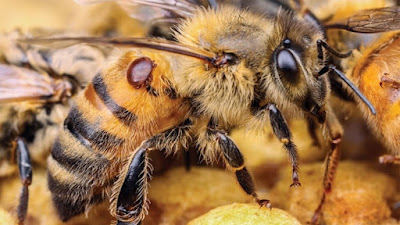In Atlantic Canada, and worldwide, varroa mites present an immense challenge to honey bee health. These parasitic mites feed directly on honey bees and cause further devastation as vectors of deadly viruses, such as Deformed Wing Virus. There is a growing concern in the Canadian beekeeping industry that varroa mites are developing resistance to our leading treatment option, Apivar®. Today, we will discuss this concern and how to respond.
When Mites Fight Back
Earlier this month, an article out of the Manitoba Co-Operator featured an interview with the provincial apiculturist Rhéal Lafrenière who stated, “The consensus is that general efficacy, countable efficacy of that product – Apivar – is quite variable. It is probably no longer in that 90 percentile range” (Stockford 2022). When Apivar was first approved for use in Canada, it was a highly effective miticide and, as such, became heavily used by beekeepers. However, the danger in relying on a single chemical miticide is development of resistance (Pernal and Clay 2013). This may be what we are experiencing now.
Lafrenière noted in this interview that it is not clear whether the
recent reduction in Apivar efficacy is due to mite resistance or perhaps
environmental conditions. This uncertainty can, in part, be resolved through
research and credible efficacy trials.
In support of this effort, Canadian Association of Professional
Apiculturists (CAPA) has committed to developing a unified approach in tackling
the challenges of varroosis and miticide efficacy. Efficacy trials are a
priority for beekeeping research and extension groups across the country. Periodic testing of chemical miticides has
become a main concern for everyone involved in the beekeeping industry.
At the local level, beekeepers have begun to request regionally specific research to identify resistance in Atlantic Canada. In 2017 and 2018, ATTTA preformed efficacy testing in the Maritime region and at this time, the average mite mortality of Apivar for the hives tested was 99.8% (Olmstead et al. 2019)! Having been done nearly five years ago and in light of current concerns, this work requires updating. To achieve this, a small group including ATTTA is working to resource and implement an efficacy research trial in the 2022 beekeeping season.
Together with periodic testing for miticidal resistance, an integrated pest management (IPM) approach is essential to sustainable long-term control of varroa mites (Jack and Ellis 2021). IPM uses a combination of methods for managing hive health, including cultural, physical, biological, and chemical treatments. ATTTA has a comprehensive factsheet describing several Varroa Mite Management Options for Atlantic Canada in consideration of IPM practices. A critical point is that the use of synthetic treatment options, such as Apivar, must be rotated to improve longevity as an effective miticide.
It appears that varroa
mites are fighting back against Apivar. Efficacy testing will be necessary to
validate this objectively. In the mean time, testing your hives for varroa
mites before and after treatment is a valuable way to keep track of mite
populations in your own apiary and apply treatments when necessary. Testing is
a critical practice in integrated pest management, an approach which will be
critical in the continued struggle against varroa mites.
Fundamentals of Beekeeping
Another great resource for learning about varroa mite management is the Fundamentals of Beekeeping! After the success of last year, ATTTA and Dalhousie are excited to offer the Fundamentals of Beekeeping training program in 2022. Content will be fully online, with the option to join in person for Saturday sessions! (COVID-19 restrictions permitting). Click here for more information and enrollment options!
Connecting with ATTTA Specialists


